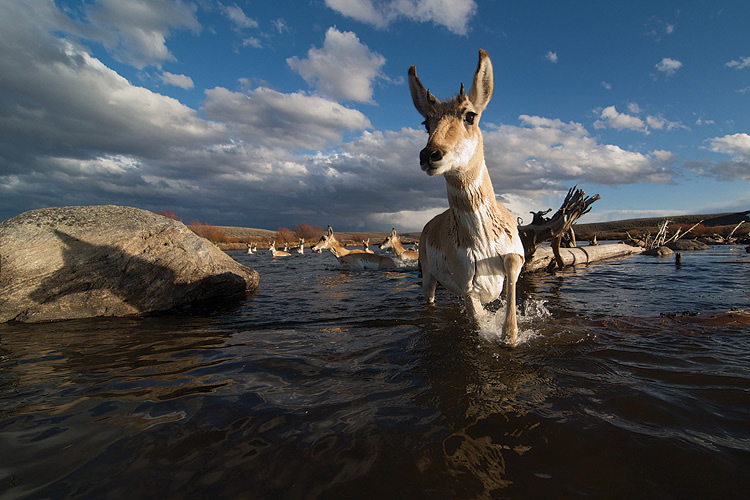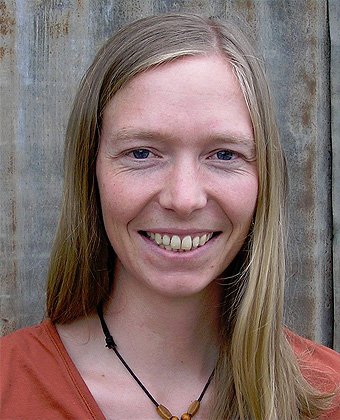
The Bill Lane Center for the American West, Stanford University

High Country News wins 2012 Knight-Risser Prize
A writing and photography team from High Country News has won the 2012 Knight-Risser Prize for Western Environmental Journalism, for a two-year project on pronghorn antelope migration in Wyoming.
Lead writer Emilene Ostlind, photographer Joe Riis and contributors Mary Ellen Hannibal and Cally Carswell combined for the special report, “Perilous Passages.” The report gave readers a first-hand view of migration of the pronghorns along a 120-mile route, part of which is the first migration path designated for protection by the U.S. Forest Service.
Special Citation to Seattle Times
Judges in the contest also awarded a special citation to Lynda Mapes of the Seattle Times for the special report, “Elwha: The Grand Experiment,” focusing on the largest dam-removal project in the history of North America.
The Knight-Risser Prize recognizes the best environmental reporting on the North American West — from Canada through the United States to Mexico. The prize includes a cash award of $5,000, and the winner participates in the annual Knight-Risser Prize Symposium, which brings journalists, researchers, scholars and policy makers together with public audiences to explore new ways to ensure that sophisticated environmental reporting survives in the West.
The prize is named for James Risser, two-time Pulitzer Prize winner and director emeritus of the John S. Knight Journalism Fellowships at Stanford. It is co-sponsored by the Knight Fellowships and the Bill Lane Center for the American West, with an endowment from the John S. and James L. Knight Foundation.
Judges for the prize were Jim Bruggers, environment writer, Louisville Courier-Journal and former president of the Society of Environmental Journalists; Beth Daley, environment writer, The Boston Globe and a 2012 Knight Fellow; Raul Ramirez, executive director of news and public affairs, KQED Public Radio; and Bud Ward, editor, Yale Forum on Climate Change and the Media.
Ostlind faced severe obstacles in her determination to see the pronghorn migration first hand. “She got lost in drainages, battled through thick brush, and post-holed her way through deep snow,” High Country News executive director Paul Larmer wrote in his nominating letter. “Over many miles, she slowly learned the landscape, much the way pronghorn fawns do as they follow their mothers along the migration route.”
Related: Knight-Risser Prize Winner Spent Two Years on the Trail of Migrating Pronghorn |
The photography challenges were no less daunting, Larmer wrote. “Riis also hiked and explored the corridor, scouting locations where he could set remote cameras that would capture the essence of migration in close-up, wide-frame cameras that could provide rare glimpses of antelope in motion and the landscape through which they moved.”
James Bettinger, director of the John S. Knight Journalism Fellowships at Stanford, commended “Elwha: The Grand Experiment” for its thoroughness and the integration of graphics and photographs in its online component. “It really illustrated the power of that aspect of media that we have now.”
The Knight-Risser Prize for Western Environmental Journalism is a joint venture of the John S. and James L. Knight Foundation, the John S. Knight Journalism Fellowships at Stanford and the Bill Lane Center for the American West at Stanford.
The John S. and James L. Knight Foundation supports transformational ideas that promote quality journalism, advance media innovation, engage communities and foster the arts. The foundation believes that democracy thrives when people and communities are informed and engaged.
The John S. Knight Journalism Fellowships is an ambitious catalyst for journalism innovation, entrepreneurship and leadership. Fellows spend their year absorbing knowledge, honing skills and developing journalism prototypes. They leverage the resources of a great university and Silicon Valley while learning from rich interactions with journalists from around the world.
The Bill Lane Center for the American West is dedicated to advancing scholarly and public understanding of the past, present, and future of western North America. The Center supports research, teaching, and reporting about western land and life in the United States, Canada, and Mexico.


Judges were impressed with the effort put into “Perilous Passages.” The storytelling was not only expert and empathetic but offered a new way of looking the issue, they said. “It was unique in making me want to retrace the steps, but also in making me feel like I was there,” said Bud Ward. “I thought it was an extraordinary piece.”
Texas Tribune, ProPublica

The Desert Sun and USA Today

CPI, InsideClimate News, The Weather Channel

The Seattle Times

The Sacramento Bee

High Country News

5280 Magazine

Seattle Post-Intelligencer

What Went Wrong?
The Seattle Times

San Antonio Express-News

The Los Angeles Times

High Country News




